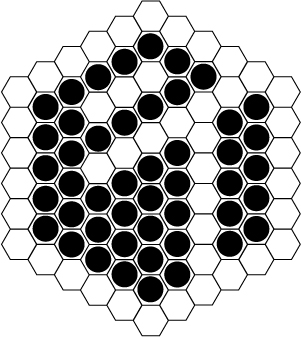Variants are a good way to get new insights into old familiar games and keep things from getting stale. Some of the most interesting variants are based on replacing the square tiles of a standard chess board with hexagons.
Most games played on an eight by eight rectangular board have been adapted to a six by six by six hex board (such as the one used for Agon). You can find game sets with these boards at many game stores (including mine) or you can create them yourself with pretty much any computer graphics program.
The following list is by no mean exhaustive but it should be a good introduction. You can find complete rules for each game by following the links.
Hexagonal Checkers
I don't know that there's really a standard version of hexagonal checkers so I decided to play around with this one and borrowed the border restriction from Kruzno (you can find a number of others online). There's no reason you can't do some experimenting on your own. (let me know if you come up with something interesting.)

Hexagonal Chess
As previously mentioned, Władysław Gliński's chess variant is hugely popular in Europe (more than 100,000 sets have been sold). I've played this one quite a bit and had a good time with it.

You can probably figure most of the moves out for yourself. The only pieces that might give you trouble are the bishops and,to a lesser extent, the knights.

Bishops come in three colors, which points out an interesting topological feature of a hexagonal grid which I'm betting you can spot for yourself.
TacTex
I believe Piet Hein himself may have come up with this variation on his game TacTix.

Hexagonal Reversi
There's a rather complicated intellectual property background to the game Reversi/Othello, but the game itself couldn't be simpler. Here's one configuration for playing it on a hexagonal board.

I wasn't able to find a standard version of hexagonal reversi. This version seems to work well but there may be room for improvement.
* Always remember to flip your fitness landscape upside-down before dropping your marble. Energy landscapes should be good to go.
For a more on this, take a look at "Fitness Landscapes, Ozark Style."
No comments:
Post a Comment